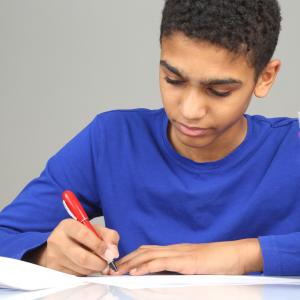I pulled out the high-dollar words for today’s title, didn’t I?
If you are homeschooling a child with executive function struggles, today’s post is for you. Executive function is something we’ve talked about before with ADHD and autism. Executive function refers to a whole set of skills that are relevant to how well you use your brain to accomplish tasks. If you experience ADHD or autism, you may have more trouble than is typical getting your brain to do a certain task, and you may need to spend time training your brain to be better at executive functioning.
What is Metacognition?
 Today’s topic is metacognition. Metacognition is all about how well you coordinate the efforts that different parts of your brain are making. That sounds complicated, right? Let’s go over an example.
Today’s topic is metacognition. Metacognition is all about how well you coordinate the efforts that different parts of your brain are making. That sounds complicated, right? Let’s go over an example.
Let’s say you were told you had to use a new recipe to make a batch of cookies. Metacognition would kick in to remind you what the steps were the last time you made cookies. Then, you will think about how you probably need to preheat the oven first and find both the cookie pans and the mixing bowl to use. Your brain realizes these will be necessary even before you read the recipe.
Metacognition also can kick in and remind you that the last time you made cookies, you made mistakes. Perhaps you left out an ingredient. In that case, your brain will remind you to triple-check the recipe, especially for that salt you forgot last time. In this way, your brain starts troubleshooting before you even get started.
When you do read through the recipe, metacognition will kick in and help you remember if you have ever made cookies like this before. It will make connections like “Oh, this recipe for oatmeal raisin cookies is a lot like the one I use for oatmeal chocolate chip cookies.” That additional connection will again trigger memories of things that have gone well or poorly in the past. You might even decide to tweak the recipe you are reading to be more like the one you are used to.
It also gives you a reference to problem solve if the new recipe doesn’t include important information. You can remember what temperature you baked cookies at before or how many cookies this much dough made last time. If you didn’t remember, metacognition can remind you to go look in a cookbook you own to compare recipes to make an educated guess at the right way to make these cookies.
That is a whole lot of brain power going into making cookies, isn’t it? For most of us, we do all of that without thinking about it. However, your child may not be able to do all that. And it probably isn’t coming up in the kitchen with cookies, it probably is happening with schoolwork. We generally don’t expect kids to remember how to make cookies, but we expect them to remember and understand schoolwork. Which is strange. One comes with the obvious short-term reward of cookies and the other has the much less intriguing reward of finishing your math lesson.
Strengthening your Metacognition Muscles
Now, let’s talk about how we can help our kids develop these skills, especially with schoolwork.
First, if you have done a task like cooking, cleaning, or artwork with your child in the past, it can be helpful to read through all those tasks I said required metacognition and consider how to prompt your child for the activity. It isn’t that your child’s brain can’t do those tasks (usually) it is that they can’t do it on their own.
 So, let’s pretend you have made cookies together before and are going to bake cookies today. Before reading the recipe together, ask your child, “What do you think we will need?” and tell them to “Go get out those things.” Yes, your child may get out extra items, but you can always put them away later. Actually, having your child help put away what they didn’t need can help them make brain connections about what they did and didn’t use while making cookies. However, don’t jump to that step. First, make the cookies and just try to leave on the table what you don’t need so it can be put away clean when you are done.
So, let’s pretend you have made cookies together before and are going to bake cookies today. Before reading the recipe together, ask your child, “What do you think we will need?” and tell them to “Go get out those things.” Yes, your child may get out extra items, but you can always put them away later. Actually, having your child help put away what they didn’t need can help them make brain connections about what they did and didn’t use while making cookies. However, don’t jump to that step. First, make the cookies and just try to leave on the table what you don’t need so it can be put away clean when you are done.
Having your child work on remembering how they made cookies before and finding the tools or ingredients needed helps their brain make that connection. Often kids at this point will say, “I don’t know.” So, prompt them some. “What did we mix up the batter in last time? Can you find that?” Is much better than just telling them to get a bowl. “We will need something to bake them on, can you find something?” Is also better than just getting out the cookie sheets for them. We are building brain connections between a previous task and a new one. That is an important skill to have.
Next, you can ask them “Last time we made cookies, do you remember what went wrong?” This of course only works if you left something out, burnt the cookies or some other problem happened. But if it did, this is an ideal time to help your child gently to remember the mistake and plan how to not make that mistake this time.
Last, read the recipe together and discuss if it sounds familiar. Be sure to pause long enough for your child to really think of an answer. It is important to not jump in too fast. When children struggle with executive function, they often need longer to think of the solution or connection that others see more quickly. This applies even if they make connections quickly in other situations.
Now, how does all of this apply to schoolwork?
Math
 In math, we frequently have a similar situation. We need to ask ourselves: Have I seen a problem like this before? What did I do right or wrong? If I know from experience I tend to make mistakes when borrowing or working with negative numbers, I can be extra careful on problems with those steps. If you are using a math sheet, your child may even be able to look back to different parts of the worksheet for help if they get stuck.
In math, we frequently have a similar situation. We need to ask ourselves: Have I seen a problem like this before? What did I do right or wrong? If I know from experience I tend to make mistakes when borrowing or working with negative numbers, I can be extra careful on problems with those steps. If you are using a math sheet, your child may even be able to look back to different parts of the worksheet for help if they get stuck.
The same patience and encouragement we used while making cookies applies here. When your child faces a problem they say they don’t know how to work, ask them to think about what they have seen that is similar. Talk it through with them, and if they really can’t remember, remind them of last week’s work and how it was similar. If they get stuck on a problem that is similar to one they already worked on the same worksheet, encourage them to look back at the rest of the page for clues.
And finally, if they keep making the same mistake over and over, point out to them that this thing is “tricky” and when approaching a new problem with the same potential to struggle, remind them that these are “tricky” and to be careful with it. Feel free to remind them of the specific rule they keep forgetting. Eventually, it will stick for them.
With reminders and encouragement, the child’s brain will start making those connections on its own. This is much like how you let them hold your fingers while they learn to walk. They need a little support while they work on learning to think more broadly and problem-solve.
Language Arts
All these rules can also apply if your child struggles with reading, spelling, or essay writing. At each level, whatever the task, taking time to remember where they have seen it before helps.
Reading: Have you seen this letter combo somewhere before? What sound did “ph” make last time we had a word with it?
Spelling: Can you picture this word in your mind? We practiced it before, what was the rule about when to use C or K?
 Essay writing is a little different. I recommend having your child read an essay first. Point out all the parts of an essay, and then ask them to write an essay. If they have written essays in the past, remind them of how they got started before. Did they research first? Did they make a list or outline first? Or do they like to focus on writing an attention-grabbing first paragraph first?
Essay writing is a little different. I recommend having your child read an essay first. Point out all the parts of an essay, and then ask them to write an essay. If they have written essays in the past, remind them of how they got started before. Did they research first? Did they make a list or outline first? Or do they like to focus on writing an attention-grabbing first paragraph first?
In my experience, getting started is often the hardest part of essay writing for those with executive function issues. And writing great essays requires high levels of metacognition as you draw connections and conclusions between different topics. This level of difficulty is why I don’t think we should ask younger students to write essays.
But, let’s say you are working with your high school student on essays. This is a great time to ask them the tell you all they know on the topic of the essay and make notes for them. You can even put each idea on a note card and then let them sort through those cards as they work on their essay. Metacognition allows us to pull all those thoughts together, but if your student is struggling with that step, there is nothing wrong with prompting them and helping their brain to have everything in front of them.
It Takes Time and Practice
Metacognition isn’t easy to describe or learn. Everyone has to develop those skills at their own pace and through many different activities. So, be sure to give your child many chances to develop those skills and extra time to use them.





0 Comments